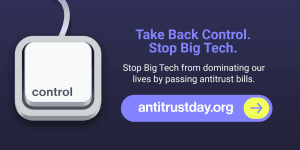Antitrust Day ’22: Putting people back in control of tech
April 04, 2022 / Current Affairs, Event / By Alex Linton
When the internet first emerged, it was a diverse playground that was owned by everyone (and no one). But over the years, a small sect of tech companies have grown, and grown, and grown — and now they are gigantic forces casting a dark, looming shadow over the world of technology. These lucky few—companies like Amazon, Apple, Microsoft, Google, and Facebook—hold an incredible amount of power in a world which is becoming increasingly dependent on technology. With the technological acceleration which has resulted from the pandemic, it’s almost impossible to go a day without needing technology — and perhaps even harder to go a day without the watching eyes of big tech companies following you; tracking you; learning about you.
With this concentration and centralisation of power comes a slew of issues. People’s digital rights are threatened by common practices like exploitation of personal data, censorship, and anti-competitive behaviour. Digital rights are human rights. The actions of big tech are having a serious detrimental impact on people’s right to privacy, dignity, and freedom of expression. But people are fighting back.
Foundations like the OPTF are working to create technology which is decentralised, open, and protects people’s rights. We are not only collaborating with the people who will use and benefit from the technology we build — they also own and operate the technology themselves.
But we can do more. This Antitrust Day we are working to put people back in control of tech.
There are two proposed bills which are being advocated for this Antitrust Day.
The first, The American Innovation and Choice Online Act, also known as ‘the self preferencing bill’ would stop supersized tech companies from preferencing their own products in search results and defaults, and from using data generated by competitors’ use of their products to build competing products.
The other, The Open App Markets Act, also known as ‘the App Store bill’ would force companies that make hardware; operating systems; and app marketplaces (Apple and Google) to allow users to install apps directly (side-loading), choose alternative app stores (like F-Droid), uninstall pre-packaged apps, and change their default apps. The App Store bill is extremely important for ensuring the strength of consumer choice and allowing people to choose open-source alternatives.
What can you do?
Breaking up big tech is a big job. There are lots of ways to go about it — and it will likely take a combination of building alternative options, educating about the dangers of centralised tech power, and advocating for change to make a significant dent.
Here are some simple things you can do to contribute this Antitrust day.
Sign the
Share the
Post on social media using the hashtag # AntitrustDay
Across the Atlantic
Obviously the agenda this Antitrust Day is very US-focused — it is discussing American companies and American legislation. However, these are issues which are impacting people all over the world — including the country the OPTF calls home, Australia.
Big tech has been exploiting people all across the world for too long. This is a global problem, and it will require participation and collaboration from people all across the world to achieve real change which will benefit us all.
Latest blog posts
The OPTF and Session
The OPTF is transferring its responsibilities as steward of the Session project to the newly established Swiss foundation, the Session Technology Foundation.
READ MORE »
October 15, 2024
Cyber laws around the world: Privacy is not the policy
There is no doubt that the European Union’s GDPR has changed the cyber regulation landscape forever. As onlookers from non-EU countries urge their governments and regulators to adopt similar legislation, countries are rapidly adopting their
READ MORE »
December 04, 2022
The long and winding road : Striving for data protection in Indonesia
Juliana Harsianti is an independent researcher and journalist working at the intersection of digital technology and social impact. The long awaited Indonesian Personal Data Protection Bill was approved by the parliament on 20 September 2022.
READ MORE »
November 17, 2022
